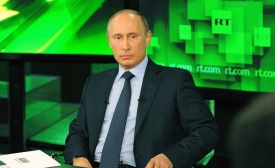russia
Of the nations that practice information warfare, the most persistent is Russia. In a recent article for the Institute for the Study of War, Maria Snegovaya describes Russia’s dexterity at using “reflexive control,” which she defines as shaping an adversary’s perceptions of a situation so that this adversary proceeds to act in the way Russia wants.

Philip Seib on Russia and disinformation.
More than 150 world leaders gathered in New York City for the 70th session of the UN General Assembly, each with different diplomatic priorities and interests.
Russia knows that soft power requires hard power. Given the mutually hurting stalemate in Syria, the only way to convince Assad that the terms of peace will not be against his interests was to back him up militarily.
Throughout China’s history, elements of hybrid warfare have often been crucial components of its conflicts with its neighbors. [...] The contemporary analogy would be “diplomatic warfare”; neutralizing unfriendly states through public diplomacy, support for local insurgencies and pressure in international organizations.
Concerns about the closing of the American Center in Moscow appear to be overblown. Russia is still open to new ideas and the constructive role that can be played by soft power. [...] This may look like a form of paranoia, but truly speaking, the major goal is to find a fine line between culture and politics.
The closure of the American Center in Moscow is just the latest step taken by the Kremlin to crack down on U.S. public diplomacy initiatives within Russia and ratchet up anti-Western sentiment.[...] As Ambassador Tefft suggests, the move marks the culmination of a decades-long process of undermining U.S. cultural influence in Russia that emerged in the wake of the post-perestroika euphoria and belief in the rosy future of Russian-U.S. relations.

What is the relationship between media, message and public diplomacy?







